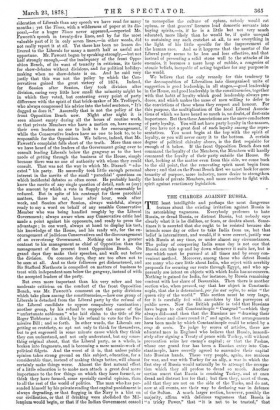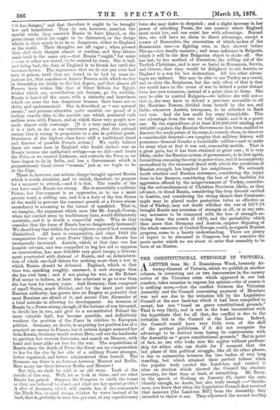THE CHARGES AGAINST RUSSIA. T HE least intelligible and perhaps the
most dangerous feature about the existing irritation against Russia is its astonishing vagueness. Everybody professes to hate Russia, or dread Russia, or distrust Russia, but nobody says clearly what it is he dislikes, or fears, or doubts about. Some- times it is asserted that she ought to be resisted because she- intends some day or other to take India from us, but that belief is intermittent, and would, if it were correct, justify war with Russia at any time, or under almost any circumstances.. The policy of conquering India some day is not one that Russia can take up and lay down whenever it suits her, but is which must be pursued at all times and by every con- venient method. Moreover, among those who detest Russia are many who care little about India, who reject with acerbity proposals for securing our route through Egypt, and who ap- parently are intent on objects with which India has no concern. Nothing is gained for India, for instance, by Russia remaining content with her share of Bessarabia. Then there is another section who, when pressed, say that her object is Constanti- nople, that she is determined, per fas aut nefas, to seize " the queen city of the world." This section must be very large, for it is carefully fed with anecdotes by the purveyors of public news. Now the British public is told that Russians have begun to call Constantinople " Czargrad "—which they always did—and then that the Russians are " drawing their lines closer and closer round it ;" and again, that arrangements have been made by which Constantinople could be seized by a coup de main. To judge by scores of articles, there are educated men in England who believe that Russia, immedi- ately after signing a Treaty of peace with Turkey, will without provocation seize her enemy's capital ; or that the Pashas, whose one grand fear has been a Russian entry into Con- stantinople, have secretly agreed to surrender their capital into Russian hands. These very people, again, are anxious for war, and war with Turkey for an ally, a war in which the first step of Russia would naturally be to attempt the occupa- tion which they all profess to dread so much. Another section assert that Russia is crushing Turkey, and at once dread and distrust her for that ; but then they, most of them, add that they are not on the side of the Turks, and do not, now at all events, see their way to declaring war in defence of the Sultan. A much larger section, however, possibly the majority, affirm with delicious vagueness that Russia is "a tricky Power," that "it is not to be trusted," that " it has designs," and that therefore it ought to be brought low and humiliated. They do not, however, mention the special tricks they conceive Russia to have Payed, or the point about which she ought to be distrusted, or the design which in their minds is to be so dangerous, either to England or the world. Their thoughts are all vague ; when pressed they shift their charges almost at random, and they always come back to the same cry,—that Russia " ought," for some mason or other not stated, to be resisted by force. She is bad, and being bad, the duty of England is to thrash her until she becomes better. The arguments that we do not put even bad men in prison, until they are found to be bad by some in- jurious act, that numbers of Asiatic Powers with which we live in friendship are tricky to the last degree, and that almost all Powers have wishes like that of Great Britain for Egypt, wishes which are, nevertheless, not designs, go for nothing. Russia is hated all the same, with a sincerity and heartiness which are none the less dangerous because their bases are so shifty and undetermined. She is described as " our natural enemy," and persons otherwise quite sensible are proud of a feeling exactly akin to the ancient one which produced such endless wars with France, and at which these very people now smile almost with contempt. [It is a very curious fact, but it is a fact., as far as our experience goes, that this natural enemy idea is strong in proportion to a rise in political grade. Statesmen of the highest class have still a traditional dread and distrust of possible French action.] We verily believe there are some men in England who would declare war on Russia because she authorised serfage—as we did—and treats the Poles as we treated Irishmen, and controls the Press as we have begun to do in India, and has a Government which is preposterously timid about " treason," just as we begin to be at the Cape.
There is, however, one serious charge brought against Russia which is worth attention, and to which, therefore, we propose for a moment to attend,—and it is this. The results of the war have made Russia too strong. She is essentially a military Power, her Government is an oppressive, or to use a more precise word, a stifling one, and it is a duty of the free States of the world to prevent the constant growth of a Power whose ascendancy is menacing to the future of mankind. That is, we imagine, the argument which men like Mr. Joseph Cowen, when not carried away by traditionary bate, would deliberately maintain, and it is worth a respectful reply. Why do they consider that the force of Russia has so dangerously increased ? We should say that within the last eighteen years it had seriously diminished. All force is comparative, and since 1849 the comparative force of every Power likely to check Russia has enormously increased. Austria, which at that time was her humble servant, and was compelled to beg her aid to suppress an insurrection, has now 600,000 very good troops, a Govern- ment penetrated with distrust of Russia, and an Administra- tion of which one-half thirsts for nothing more than a war in which Russia should be defeated. England, which at that time was, speaking roughly, unarmed, is now stronger than she has ever been ; and if not pining for war, as Sir Robert Peel seems to believe, at least less reluctant to go to war than she has been for twenty years. And Germany, then composed• of small States, much divided, and for the most part under Russian authority, has grown into an Empire so powerful that most Russians are afraid of it, and accuse Czar Alexander of a fatal mistake in allowing its development. An invasion of Russia by a Power strong enough, if the fortune of war favoured, to divide her in two, and give to a reconstituted Poland the more valuable half, has become possible, and definitively weakens the position of the Czars in relation to European politics. Germany, no doubt, in acquiring her position has also acquired an enemy in France, but if serious danger menaced her from Russia, Germany would restore Metz, call out the landwehr to garrison her western fortresses, and march on Moscow, with hand and heart alike set free for the war. The acquisitions of Russia since the death of Peter the Great are no compensation to her for the rise by her side of a military Power stronger, better organised, and better administered than herself. The Germans say there is no fortress between Moscovi and Berlin. How many are there between Berlin and Moscow ?
But this, we shall be told, is an old story. Look at the results of this war. Well, let us look at them, and see what Russia has gained. Suppose the Congress to ratify the terms as they are believed to stand, and what are her special profits ? A slice of Armenia, which will enable her, if she commands the Black Sea, to send troops thither by water instead of by land, that is, probably to save five per cent, of any expeditionary force she may desire to despatch ; and a slight increase in her power of attacking Persia, the one country where England must resist her, and can resist her with advantage. Beyond this, she will have no claim to direct advantage, except a corner of Bessarabia, the annexation of which makes of the Roumanian race—a fighting racer as they showed before Plevna—her deadly enemies ; and some influence in Bulgaria, which it will be the first Bulgarian object to shake off. She has lost, by her method of liberation, the willing aid of the Turkish Christians, and is now so hated in Roumania, Servia, and Greece, that they would be delighted to aid Austria or England in a war for her destruction. All her other advan- tages are indirect. She may be able to use Turkey as a vassal, and so close the Bosphorus, but the only effect of that is that she would have in the event of war to defend a point distant from her own resources, instead of a point close to them. She may be able to control Bulgaria—we believe she will not— that is, she may have to defend a province accessible to all the Maritime Powers, divided from herself by the sea, and liable, whenever Austria interposes, to be attacked in flank and rear. And she has made her army formidable. This one advantage from the war we fully admit, and it is a grave one. By the expenditure of at least £50,000,000 sterling and 100,000 regulars, the Russian Government has been enabled to discover the weak points of its army,to remedy them, to discover a considerable General—we imagine that military history will pronounce General Gourko a formidable soldier—and to make its army what at first it was not, reasonably mobile. That is a great gain, but it has been obtained at great cost ; it is very likely, under the Russian system of government, to be lost again, favouritism resuming its sway in peace-time, and it is completely neutralised by the increased dread with which the revelation of Russian strength has inspired her neighbours. We seriously doubt whether cool Russian statesmen, considering the injury done to her finances, considering the loss of the facilities for aggression offered by the misgovernment of Turkey, consider- ing the enfranchisement of Christian Provinces likely, as they advance, to dread Russia, considering the deep distrust excited in Austria, and considering the strong chance that Constanti- nople may be placed under protection twice as effective as that of Turkey, may not doubt whether the war of 1877-78 brought Russia any accession of strength at all, or at any rate, any accession to be compared with the loss of strength ac- cruing from the events of 1870, and the probability which then arose that Germany and Austria, empires disposing of the whole resources of Central Europe, could, as regards Russian progress, come to a hearty understanding. There are plenty of topics to be discussed in Congress, but we conceive the panic under which we are about to enter that assembly to be born of an illusion.



































 Previous page
Previous page